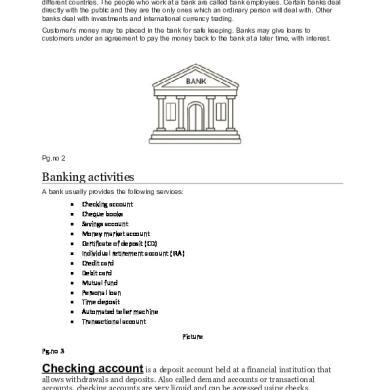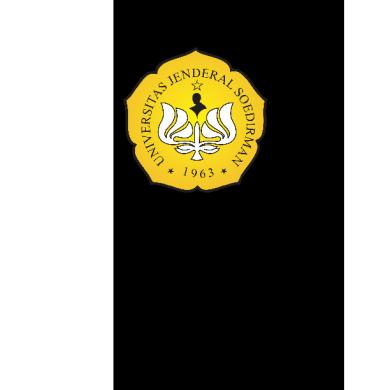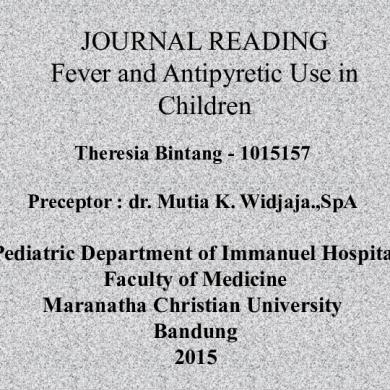* The preview only shows a few pages of manuals at random. You can get the complete content by filling out the form below.
Description
Pg.no 1 A bank is a financial institute where customers can save or borrow money. Banks also invest money to build up their reserve of money. What they do is regulated by laws. Those laws differ in different countries. The people who work at a bank are called bank employees. Certain banks deal directly with the public and they are the only ones which an ordinary person will deal with. Other banks deal with investments and international currency trading. Customer's money may be placed in the bank for safe keeping. Banks may give loans to customers under an agreement to pay the money back to the bank at a later time, with interest.
Pg.no 2
Banking activities A bank usually provides the following services:
Checking account Cheque books Savings account Money market account Certificate of deposit (CD) Individual retirement account (IRA) Credit card Debit card Mutual fund Personal loan Time deposit Automated teller machine Transactional account Picture
Pg.no 3
Checking account is a deposit account held at a financial institution that allows withdrawals and deposits. Also called demand accounts or transactional accounts, checking accounts are very liquid and can be accessed using checks, automated teller machines and electronic debits, among other methods. In Britain the term is "current account".
Pg.no 4
Saving accounts are a type of deposit account kept by banks that pay interest. They let a person keep some of their money in the bank for immediate use. They also earn money through interest. Having a savings account in a bank allows a person to have money available for an emergency. Savings accounts may be opened at most banks, credit unions and trust companies. The other major types of deposit account are the transactional account (usually known as a "checking" or "current" account), money market account and time deposit. Pg.no 5
A Certificate of deposit (CD) is a way to store money at a bank or credit union. A CD is written for a period of time: usually between three months and five years. The person who wanted the CD—the consumer—agrees to give the money to the bank for that period of time and may not take the money back until the time has expired. If the consumer takes the money back before the agreed amount of time, they will have to pay a penalty fee. Once your contract is over, you are given your money back plus the interest it earned. People open CDs instead of savings account because the interest is higher. A certificate of deposit (which is common only in the United States) is similar to a time deposit. Pg.no 6
An Individual retirement account or IRA is a form of “individual retirement plan”. It is simply a savings account with large tax advantages. An IRA is not itself an investment. It is where an investor keeps assets such as stocks, bonds and mutual funds. A 401(k) is set up by an employer, but an IRA may be started by an individual. Other IRAs may be opened by small business owners and those who are self-employed. Pg.no 7
Credit card is a card which allows people to buy items without cash. Each card has a unique number. Using this number, plus other details on the card (such as the validity date, or a code), the client can buy goods or services. The issuer of the card, then transfers the money to the seller. The person using the card gets a credit. The customer has a certain amount of time to pay the credit card bill. If the bill is left unpaid for some time, the customer will have to pay interest for the amount that is left unpaid. Payment using a credit card is one of the most common methods of electronic payment.
Pg.no 8
Debit card (also known as a bank card or check card) is a plastic card that is used as a payment method to cash when buying things. It is similar to a credit card, but unlike a credit card, it does not borrow money. Instead, the money comes directly from the user's bank account, and if there is no money it does not work.
Pg.no 9
Mutual fund is a kind of investment that uses money from investors to invest in stocks, bonds or other types of investment. A fund manager (or "portfolio manager") decides how to invest the money, and for this he is paid a fee, which comes from the money in the fund. Mutual funds are usually "open ended", meaning that new investors can join into the fund at any time. When this happens, new units, which are like shares, are given to the new investors. Pg.no 10
The full form of ATM is Automated teller machine for short, is a machine that lets people take out (withdraw) cash from their bank accounts. In the UK ATMs are often called cash machines, cashpoints or the hole in the wall. Some ATMs allow people to do more than take money out. They may allow people to put in money, or check how much money is in a bank account. ATMs may be found in stores and shopping malls. Sometimes, they can be found in bars or restaurants. Other times, at special events, people may set one up so the guests can use the machine, like at a fundraiser. People need a debit card or credit card in order to use an ATM. They will also need to have a Personal Identification Number (PIN), which is a code that lets them get into their account.













